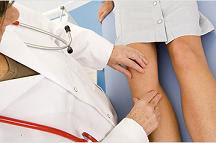 Activities like these may be what some of us live for on these upcoming mild-weather weekends, but doing physical exercise without enough strength and proper form may put players at risk for serious knee injuries, especially anterior cruciate ligament (ACL) tears. That's the type of damage in which the ligament detaches from the femur bone, and in adults, correcting the problem usually requires surgery to reconstruct the ligament. Sports involving quick cuts, twists and jumping, such as soccer, football, basketball and volleyball, cause more of these injuries than other sports. And according to a study of NCAA athletes, the tears occur at least twice as often—and in some sports up to eight times as often—in female athletes as in male athletes.
Activities like these may be what some of us live for on these upcoming mild-weather weekends, but doing physical exercise without enough strength and proper form may put players at risk for serious knee injuries, especially anterior cruciate ligament (ACL) tears. That's the type of damage in which the ligament detaches from the femur bone, and in adults, correcting the problem usually requires surgery to reconstruct the ligament. Sports involving quick cuts, twists and jumping, such as soccer, football, basketball and volleyball, cause more of these injuries than other sports. And according to a study of NCAA athletes, the tears occur at least twice as often—and in some sports up to eight times as often—in female athletes as in male athletes.Researchers at the Cleveland Clinic recently tried to pinpoint how these injuries happen and how they differ in men and women. Using motion-sensor cameras to capture joint movements, the researchers were able to reconstruct the biomechanics as athletes performed drop landings from a 40-cm hang bar. What the researchers discovered is that when the athletes first start jumping, the women are more likely to land on their feet in ways that make them vulnerable to ACL tears. The distance between their knees is narrower, the ankle is more flexed, and the foot rolls outward more. But when the athletes are fatigued, both the men and the women tend to make those same mistakes, placing both groups at high risk for the painful injury.
The researchers still haven't figured out why women land the way they do. But what we can learn from the study, published in the journal Medicine and Science in Sports and Exercise, is that although all of us may feel strong and able at first, the body needs to be prepared for the time when it becomes fatigued by an activity. The best way to do that is by paying extra attention to posture, breathing, strength and the awareness that you are getting tired while you exercise.
"When running on the treadmill sometimes we have 10 things going on to distract us—reading the paper, watching TV, thinking about our day. But when we get tired, maybe that's when it's time to really stop and focus, because of the effect on joint motion," suggests Susan Joy, the study's author and a sports-medicine doctor at the Cleveland Clinic. She emphasizes breathing control and proper posture—the spine should be aligned, with head upright, chin tucked in a bit and a good distance between the ears and the shoulders. Core strengthening also helps improve form, so exercises like sit-ups, crunches, back exercises and planks can be beneficial.
Family history is important too. Having a first-degree relative, like a sibling or parent, who has suffered an ACL tear almost doubles a person's chances of having the same injury in sports, says Joy, so that's an indication to take special precaution.
Having healthy knees means greater mobility as we age, which is why it's important not only to be on guard for sources of potential injury but also to look for signs of risk for osteoarthritis in the knee. A past knee injury or having a parent who has had a knee replacement while in his or her 50s is a clear sign that you are already at risk for wearing out your joints early. The same thing applies if you are currently experiencing any pain, swelling, tightness, cracking or grinding of the knee. Those are all tip-offs that you should discuss having an X-ray with your doctor, so that you can learn to exercise and play smarter.
Sanjay Gupta's Fit Nation series airs on House Call on CNN, Saturdays and Sundays, at 8:30 a.m. E.T.
—With reporting by Shahreen Abedin
Source : Time.com













No comments:
Post a Comment